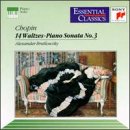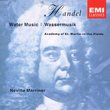| All Artists: Chopin, Brailowsky Title: 14 Waltzes / Piano Sonata #3 Members Wishing: 0 Total Copies: 0 Label: Sony Original Release Date: 1/1/1991 Re-Release Date: 4/5/1991 Genres: Dance & Electronic, Classical Styles: Forms & Genres, Sonatas, Historical Periods, Romantic (c.1820-1910), Instruments, Keyboard Number of Discs: 1 SwapaCD Credits: 1 UPC: 074644634624 |
Search - Chopin, Brailowsky :: 14 Waltzes / Piano Sonata #3
 | Chopin, Brailowsky 14 Waltzes / Piano Sonata #3 Genres: Dance & Electronic, Classical
|
Larger Image |
CD DetailsSimilarly Requested CDs
|
Member CD ReviewsReviewed on 9/27/2014... Serviceable readings of part of the Chopin literature. Still great technique (Brailowsky had to have been in his mid to late 60's when these recordings were made), but doesn't have the depth of feeling you'd find, say, in Rubinstein's or Cortot's readings. Glad I tried them, though, especially since the price was right.
CD ReviewsAlexander Brailowsky?s Performance of the 14 Chopin Waltzes Peter Dietrich | Boston, MA United States | 11/02/2003 (5 out of 5 stars) "Alexander Brailowsky's Performance of the 14 Chopin Waltzes - a definitive version By Peter Dietrich, President, Chopin Society of New England Alexander Brailowsky's performance of the fourteen Chopin waltzes seems to be among the definitive versions. This stereo recording from the early sixtees and the previous one on LP for RCA Victor LM1082 recorded in the early fifties, equals in sound and profound understanding of the two great versions by Artur Rubinstein recorded in 1953 and 1963 respectively. The four recordings are milestones of the classical waltzes. Their interpretations have achieved expert fluidity with grace and elegance of the nobility, as Robert Schumann remarked "should be danced at least by countesses." To the above four recordings I will add Dinu Lipatti's recording issued by EMI in the Great Recordings of the century series. My opinion is based on hearing a great number of outstanding as well as good performances through more than fifty years. I will just list several additional names from my collection who have recorded fourteen waltzes: 1) Robert Lortat (1930), 2) Alfred Cortot (1934 and 1943), 3) Edward Kilenyi (1952), 4) Moura Lympany (1959), 5) Witold Malcuzynski (1959), 6) Regina Smendzianka (1959 and 1961), 7) Samson Francois (1964), 8) Stefan Askenase (1964), 9) Adam Harasiewicz (1965), 10) Tamas Vassary (1966); pianists who have recorded nineteen waltzes : 1) Augustin Anievas (1970), 2) Geoges Cziffra (1979), 3) Claudio Arrau (1980 - several of the waltzes are played too slow), 4) Vladimir Ashkenazy (1984), 5) Lidia Grychtolowna (1989), 6) Istvan Szekely (1992), 7) Garrick Ohlsson (1996 - 20 waltzes in this recording) 8) Jerzy Sterczynski (1996 - 23 waltzes, which will be discussed in the future). I have also heard a large number of selected waltzes including Vladimir Horovitz and Jose Iturbi. Some of the individual performances are also very beautiful, as Vladimir Horovitz's recording of the Waltz Op. 34 No. 2 and Evgeni Kissin's of the famous C# minor Op. 64, No. 2 in his Carnegie Hall debut. My copies of the waltzes with Alexander Brailowsky - first: LP Columbia MS6228 stereo, which was a "part of a projected series of the Complete Piano Music of Chopin played by the renowned Polish pianist Alexander Brailowsky" (not completed as far as I know) and second: CD SBK 46346 are in excellent sound. The Sonata No. 3 in B minor, Op. 58 first issued on Columbia Masterworks MS 6569 (1964) and CD SBK 46346 (1990) is a stereo remake of a great performance recorded for HMV in London in 1938 and issued on CD APR 5501 in 1993 (currently available) and also included in "Brailowsky plays Chopin", two disc set reviewed by me earlier. The stereo remake of the Sonata is a shade less successful as its famous predecessor but it is also an excellent performance. The first movement Allegro maestoso opens by the artist with a bold sweep of grandeur and proceeds toward a splendid profusion of thematic ideas set forth with great freedom within the framework of the sonata form. The Scherzo, Molto vivace is a short movement requiring a great technique and musicianship which Brailowsky plays to perfection. The third movement Largo which requires a perfect legato, phrasing and the ability to create a contemplative elegiac mood shows Brailowsky at his lyrical best. The Finale, Presto non tanto, is a notorious pianistic proving ground. Considered by many as unplayable but under Brialowsky's hands it becomes a powerful masterpiece of great musical and technical display. The Sonata Op. 58 has a great competition particularly from Rubinstein, Kempff and Lipatti. But the waltzes? No matter where you look, you will not find them as good Having Brailowsky, Rubinstein and Lipatti recordings you can safely say that you "own" the Chopin Waltzes. No further recommendations are necessary." Brailowsky rules! Lee Hartsfeld | Central Ohio, United States | 08/17/2002 (5 out of 5 stars) "Alexander Brailowksy's heydey was in the 1920s and 1930s. These recordings are from the twilight of his career, and what he must have sounded like in his prime! His performance of Chopin's magnificent Sonata No. 3 is something to cherish forever, especially in the pulse-pounding final movement. The only drawback is the sound, which was apparently accomplished with a microphone placed next to the piano hammers. What in the world was anyone thinking? Highly recommended, anyway."
|

 Track Listings (18) - Disc #1
Track Listings (18) - Disc #1
